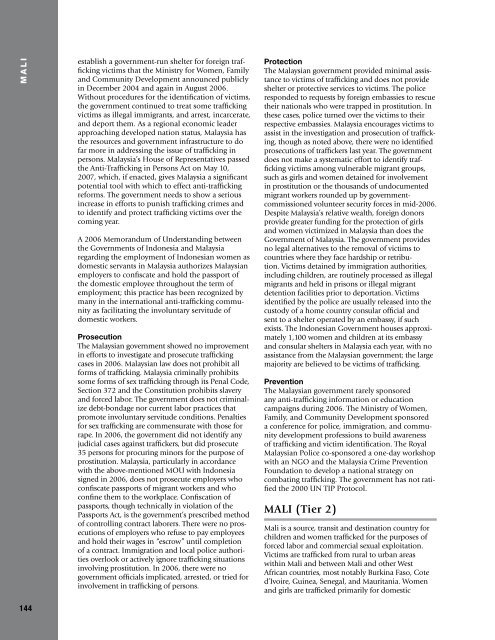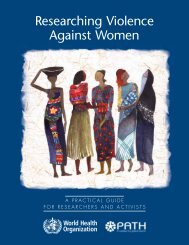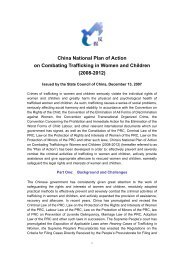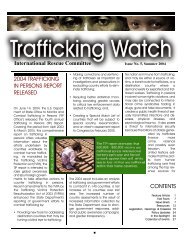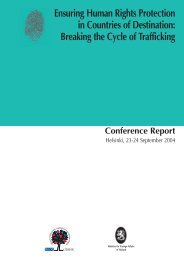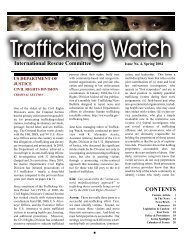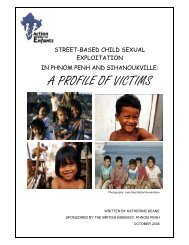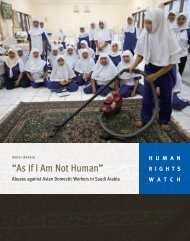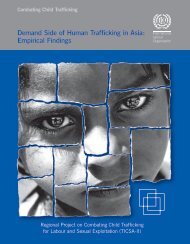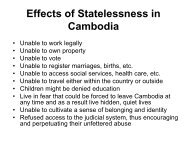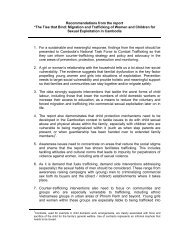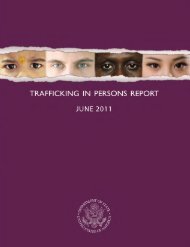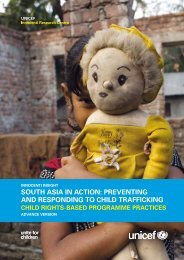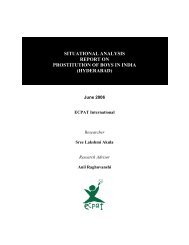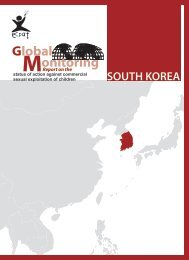2007 Trafficking in Persons Report - Center for Women Policy Studies
2007 Trafficking in Persons Report - Center for Women Policy Studies
2007 Trafficking in Persons Report - Center for Women Policy Studies
You also want an ePaper? Increase the reach of your titles
YUMPU automatically turns print PDFs into web optimized ePapers that Google loves.
M A L I<br />
144<br />
establish a government-run shelter <strong>for</strong> <strong>for</strong>eign traffick<strong>in</strong>g<br />
victims that the M<strong>in</strong>istry <strong>for</strong> <strong>Women</strong>, Family<br />
and Community Development announced publicly<br />
<strong>in</strong> December 2004 and aga<strong>in</strong> <strong>in</strong> August 2006.<br />
Without procedures <strong>for</strong> the identification of victims,<br />
the government cont<strong>in</strong>ued to treat some traffick<strong>in</strong>g<br />
victims as illegal immigrants, and arrest, <strong>in</strong>carcerate,<br />
and deport them. As a regional economic leader<br />
approach<strong>in</strong>g developed nation status, Malaysia has<br />
the resources and government <strong>in</strong>frastructure to do<br />
far more <strong>in</strong> address<strong>in</strong>g the issue of traffick<strong>in</strong>g <strong>in</strong><br />
persons. Malaysia’s House of Representatives passed<br />
the Anti-<strong>Traffick<strong>in</strong>g</strong> <strong>in</strong> <strong>Persons</strong> Act on May 10,<br />
<strong>2007</strong>, which, if enacted, gives Malaysia a significant<br />
potential tool with which to effect anti-traffick<strong>in</strong>g<br />
re<strong>for</strong>ms. The government needs to show a serious<br />
<strong>in</strong>crease <strong>in</strong> ef<strong>for</strong>ts to punish traffick<strong>in</strong>g crimes and<br />
to identify and protect traffick<strong>in</strong>g victims over the<br />
com<strong>in</strong>g year.<br />
A 2006 Memorandum of Understand<strong>in</strong>g between<br />
the Governments of Indonesia and Malaysia<br />
regard<strong>in</strong>g the employment of Indonesian women as<br />
domestic servants <strong>in</strong> Malaysia authorizes Malaysian<br />
employers to confiscate and hold the passport of<br />
the domestic employee throughout the term of<br />
employment; this practice has been recognized by<br />
many <strong>in</strong> the <strong>in</strong>ternational anti-traffick<strong>in</strong>g community<br />
as facilitat<strong>in</strong>g the <strong>in</strong>voluntary servitude of<br />
domestic workers.<br />
Prosecution<br />
The Malaysian government showed no improvement<br />
<strong>in</strong> ef<strong>for</strong>ts to <strong>in</strong>vestigate and prosecute traffick<strong>in</strong>g<br />
cases <strong>in</strong> 2006. Malaysian law does not prohibit all<br />
<strong>for</strong>ms of traffick<strong>in</strong>g. Malaysia crim<strong>in</strong>ally prohibits<br />
some <strong>for</strong>ms of sex traffick<strong>in</strong>g through its Penal Code,<br />
Section 372 and the Constitution prohibits slavery<br />
and <strong>for</strong>ced labor. The government does not crim<strong>in</strong>alize<br />
debt-bondage nor current labor practices that<br />
promote <strong>in</strong>voluntary servitude conditions. Penalties<br />
<strong>for</strong> sex traffick<strong>in</strong>g are commensurate with those <strong>for</strong><br />
rape. In 2006, the government did not identify any<br />
judicial cases aga<strong>in</strong>st traffickers, but did prosecute<br />
35 persons <strong>for</strong> procur<strong>in</strong>g m<strong>in</strong>ors <strong>for</strong> the purpose of<br />
prostitution. Malaysia, particularly <strong>in</strong> accordance<br />
with the above-mentioned MOU with Indonesia<br />
signed <strong>in</strong> 2006, does not prosecute employers who<br />
confiscate passports of migrant workers and who<br />
conf<strong>in</strong>e them to the workplace. Confiscation of<br />
passports, though technically <strong>in</strong> violation of the<br />
Passports Act, is the government’s prescribed method<br />
of controll<strong>in</strong>g contract laborers. There were no prosecutions<br />
of employers who refuse to pay employees<br />
and hold their wages <strong>in</strong> “escrow” until completion<br />
of a contract. Immigration and local police authorities<br />
overlook or actively ignore traffick<strong>in</strong>g situations<br />
<strong>in</strong>volv<strong>in</strong>g prostitution. In 2006, there were no<br />
government officials implicated, arrested, or tried <strong>for</strong><br />
<strong>in</strong>volvement <strong>in</strong> traffick<strong>in</strong>g of persons.<br />
Protection<br />
The Malaysian government provided m<strong>in</strong>imal assistance<br />
to victims of traffick<strong>in</strong>g and does not provide<br />
shelter or protective services to victims. The police<br />
responded to requests by <strong>for</strong>eign embassies to rescue<br />
their nationals who were trapped <strong>in</strong> prostitution. In<br />
these cases, police turned over the victims to their<br />
respective embassies. Malaysia encourages victims to<br />
assist <strong>in</strong> the <strong>in</strong>vestigation and prosecution of traffick<strong>in</strong>g,<br />
though as noted above, there were no identified<br />
prosecutions of traffickers last year. The government<br />
does not make a systematic ef<strong>for</strong>t to identify traffick<strong>in</strong>g<br />
victims among vulnerable migrant groups,<br />
such as girls and women deta<strong>in</strong>ed <strong>for</strong> <strong>in</strong>volvement<br />
<strong>in</strong> prostitution or the thousands of undocumented<br />
migrant workers rounded up by governmentcommissioned<br />
volunteer security <strong>for</strong>ces <strong>in</strong> mid-2006.<br />
Despite Malaysia’s relative wealth, <strong>for</strong>eign donors<br />
provide greater fund<strong>in</strong>g <strong>for</strong> the protection of girls<br />
and women victimized <strong>in</strong> Malaysia than does the<br />
Government of Malaysia. The government provides<br />
no legal alternatives to the removal of victims to<br />
countries where they face hardship or retribution.<br />
Victims deta<strong>in</strong>ed by immigration authorities,<br />
<strong>in</strong>clud<strong>in</strong>g children, are rout<strong>in</strong>ely processed as illegal<br />
migrants and held <strong>in</strong> prisons or illegal migrant<br />
detention facilities prior to deportation. Victims<br />
identified by the police are usually released <strong>in</strong>to the<br />
custody of a home country consular official and<br />
sent to a shelter operated by an embassy, if such<br />
exists. The Indonesian Government houses approximately<br />
1,100 women and children at its embassy<br />
and consular shelters <strong>in</strong> Malaysia each year, with no<br />
assistance from the Malaysian government; the large<br />
majority are believed to be victims of traffick<strong>in</strong>g.<br />
Prevention<br />
The Malaysian government rarely sponsored<br />
any anti-traffick<strong>in</strong>g <strong>in</strong><strong>for</strong>mation or education<br />
campaigns dur<strong>in</strong>g 2006. The M<strong>in</strong>istry of <strong>Women</strong>,<br />
Family, and Community Development sponsored<br />
a conference <strong>for</strong> police, immigration, and community<br />
development professions to build awareness<br />
of traffick<strong>in</strong>g and victim identification. The Royal<br />
Malaysian Police co-sponsored a one-day workshop<br />
with an NGO and the Malaysia Crime Prevention<br />
Foundation to develop a national strategy on<br />
combat<strong>in</strong>g traffick<strong>in</strong>g. The government has not ratified<br />
the 2000 UN TIP Protocol.<br />
MALI (Tier 2)<br />
Mali is a source, transit and dest<strong>in</strong>ation country <strong>for</strong><br />
children and women trafficked <strong>for</strong> the purposes of<br />
<strong>for</strong>ced labor and commercial sexual exploitation.<br />
Victims are trafficked from rural to urban areas<br />
with<strong>in</strong> Mali and between Mali and other West<br />
African countries, most notably Burk<strong>in</strong>a Faso, Cote<br />
d’Ivoire, Gu<strong>in</strong>ea, Senegal, and Mauritania. <strong>Women</strong><br />
and girls are trafficked primarily <strong>for</strong> domestic


